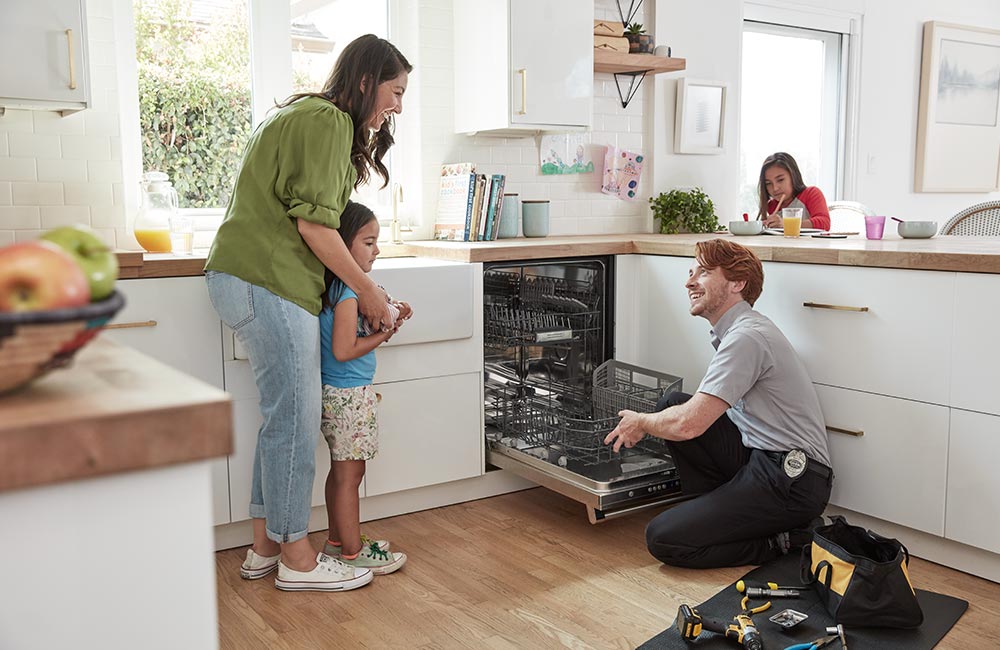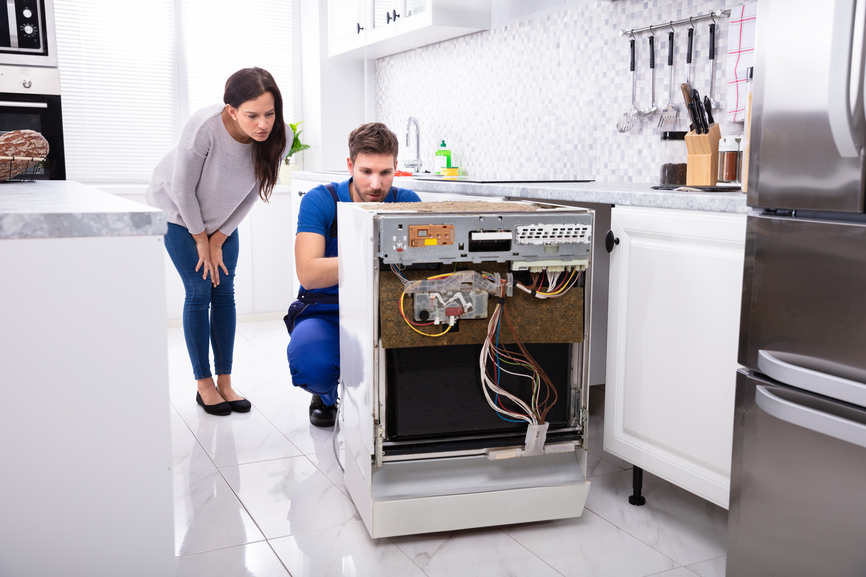The Ultimate Guide to Recognizing Device Fixing in your home
When your fridge quits cooling down or your stove refuses to warmth, it can feel overwhelming. Understanding appliance fixing in your home can conserve you money and time. You'll learn to acknowledge signs and symptoms, make use of important devices, and comply with an organized troubleshooting process. However before you start, there are critical safety preventative measures you require to think about. What are the most usual troubles, and how can you repair them? Let's explore the basics.
Usual Appliance Problems and Their Symptoms
When your devices begin breaking down, it's necessary to identify the indicators beforehand. Neglecting them can cause larger problems and pricey repairs. If your fridge isn't cooling properly, you could observe warm spots or condensation creating. This could suggest a failing compressor or an obstructed vent.Your dish washer might show troubles with dirty meals or uncommon noises during cycles. If you hear grinding or clanking, it's time to investigate.A washing device that won't spin or drain pipes can leave you with soaked washing, suggesting a stopped up drainpipe or a malfunctioning pump.Lastly, if your oven's temperature level appears off or it takes permanently to preheat, you may be taking care of a faulty thermostat. By remaining sharp to these signs and symptoms, you can resolve concerns before they rise right into significant repair work.
Important Devices for Appliance Repair Work
When you're tackling home appliance fixings in the house, having the right tools is crucial. Standard hand tools like screwdrivers and pliers will assist you dismantle and deal with various devices, while electric screening devices assure you're functioning safely with circuitry. Allow's review what you need to get going on your fixing journey.
Basic Hand Tools
Having the right devices is important for efficient home appliance repair service at home. Beginning with a dependable screwdriver collection, including both flathead and Phillips types, as screws are usual in appliance assembly. Pliers are additionally important; they aid with gripping, turning, and reducing cords or little elements. A pair of needle-nose pliers can reach tight places conveniently. You'll need a good flexible wrench for tightening up or loosening nuts and bolts. An utility blade comes in handy for reducing via packaging or insulation. Don't neglect a sturdy workbench or surface area to securely organize your devices and parts. With these basic hand tools, you'll be well-prepared to take on most appliance repair services that come your way.
Electric Screening Gadgets
Together with standard hand tools, electrical screening gadgets play a necessary duty in home appliance repair. These tools assist you detect electrical issues and warranty devices operate safely. A multimeter is crucial; it measures voltage, current, and resistance, allowing you to identify issues promptly. A non-contact voltage tester is an additional must-have, letting you identify live cords without making straight contact, enhancing your security. Clamp meters are fantastic for determining existing circulation in cords without separating them, saving you effort and time. Additionally, circuit testers can rapidly check if outlets are working effectively. By making use of these devices, you'll enhance your troubleshooting procedure and improve your repair work abilities, making device upkeep a whole lot less complicated.
Step-by-Step Overview to Diagnosing Appliance Issues
When your appliance acts up, it can be aggravating, however detecting the issue does not need to be frustrating. You'll find out to recognize common troubles and use effective repairing methods. Allow's walk with the actions to get your appliance back in functioning order.
Typical Device Issues

Troubleshooting Techniques Clarified

Repairing Major Kitchen Area Appliances: A Closer Look
Have you ever before wondered how to deal with common problems with your kitchen appliances? Fixing major cooking area home appliances like fridges, stoves, and dishwashing machines can be easier than you believe. Beginning by identifying the problem-- whether it's a refrigerator not cooling down or a stove that won't warm. Frequently, a simple reset or checking the source of power can fix the issue.For fridges, clean the condenser coils and check the door seals. If your oven's not home heating, check the home heating component and thermostat. Dishwashers may simply require a clean filter or a reset to get them back at work. Constantly disconnect the device before diving right into repair services to ensure your safety.Don' t forget to seek advice from the customer handbook for details fixing pointers connected to your model. With a little bit of patience and the right devices, you can with confidence take on device fixings and conserve money while doing so!

Repairing Laundry Equipments: Tips and Techniques
When your laundry appliances start acting up, it can feel frustrating, yet fixing them doesn't need to be an inconvenience. Begin by inspecting the power supply. Confirm the home appliance is connected in and the electrical outlet is operating. Next, examine the door or cover button; a defective button can protect against the machine from operating.For washers, if it's not rotating, check for out of balance loads. Redistributing the garments could solve the concern. If your dryer isn't home heating, clean the dust filter and check the air vent for blockages.Listen for uncommon sounds; they can suggest a problem. If your home appliance is leaking, inspect the hose pipes for fractures or loose connections. Paper any type of error codes presented on electronic screens, as they can direct read more you in identifying the concern. Ultimately, seek advice from the customer handbook for particular troubleshooting pointers connected to your version.
Safety And Security Preventative Measures to Take Throughout Fixes
Before you begin any type of device fixings, it's essential to focus on safety to protect against mishaps or injuries. First, disconnect the appliance or switch off the circuit breaker to assure no power reaches it while you function. Use protected tools to reduce the risk of electric shock. Use security goggles and handwear covers to shield on your own from sharp edges or debris (Dependable Refrigeration & Appliance Repair Service Washing Machine Repair).Make particular your work area is clean and well-lit, so you can see what you're doing. Maintain youngsters and animals away from the area to prevent distractions and prospective dangers. If you're dealing with gas home appliances, be additional careful; check for leakages prior to proceeding.Take your time, and do not hurry through repairs. If you feel unsure about any type of action, it's better to stop briefly and study than to guess. Adhering to these safety measures will certainly aid develop a more secure setting for your do it yourself home appliance repair task
When to Call a Professional for Assistance
Just how do you know if it's time to call in an expert for device repair work? If you've attempted basic troubleshooting without success, it's a clear indicator. If your device still won't start or reveals uncommon sounds after resetting it, don't wait to seek specialist help.When you notice leakages, smoke, or shedding smells, prioritize safety and call a professional promptly. These issues can result in even more considerable damage or posture risks to your home.Also, if your home appliance is under guarantee, calling a specialist is often the most effective course. They can assure that repair services won't nullify your guarantee, conserving you cash in the long run.Finally, if you're unclear or awkward with complicated repairs, it's smart to leave it to the experts. Bear in mind, dealing with complex concerns without the best competence can lead to pricey mistakes. Count on a professional when unsure!
Often Asked Concerns
Just How Can I Prevent Home Appliance Problems in the Future?
To avoid home appliance problems in the future, you ought to do regular maintenance, check for damage, clean filters, and stay clear of overloading. Remaining aggressive will certainly assist prolong their lifespan and keep them running smoothly.
What Are the Most Usual Do It Yourself Device Fixing Mistakes?
You may neglect safety preventative measures, miss fixing actions, or make use of incorrect tools when attempting DIY home appliance repairs. Hurrying the procedure or ignoring supplier guidelines can result in even more significant problems and pricey mistakes. Stay person and informed!
Exactly how Do I Know if a Component Needs Replacement?
You can inform if a part requires substitute by looking for unusual noises, leakages, or inconsistent performance. If the appliance battles to run properly or reveals visible damages, it's most likely time for a replacement.
Can I Make Use Of Generic Parts for Device Repairs?
Yes, you can make use of common components for appliance repairs, but determine they work - Dependable Refrigeration & Appliance Repair Service Washer repair near me. Generic parts could save you money, but they could influence efficiency or durability, so evaluate your options carefully prior to making a decision
What Service Warranties Cover Home Appliance Fixes?
A lot of device service warranties cover fixings for making problems, however they commonly omit damage from misuse. Inspect your warranty terms thoroughly, as some could call for utilizing qualified technicians and original parts for protection to remain legitimate.